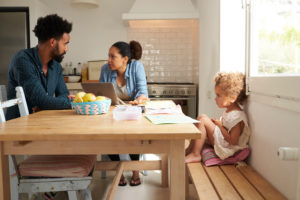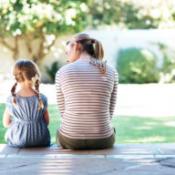 I struggled with anxiety for much of my life. It’s one of the reasons I decided to focus my practice on working with women who have anxiety. I wanted to help them understand the impact of their anxious feelings and where they come from.
I struggled with anxiety for much of my life. It’s one of the reasons I decided to focus my practice on working with women who have anxiety. I wanted to help them understand the impact of their anxious feelings and where they come from.
I didn’t always see my anxiety for what it was. It wasn’t until I was in my late 30s or early 40s that I realized my grouchiness, the tight feelings in my chest, my strong fear of bugs, my fear of talking on the phone, and moments of extreme distress were all symptoms of my anxiety. It was a relief to know I could put a name to these feelings and take action to manage my anxiety.
But having anxiety was also a burden. I was raising three children, and I began to see how my anxiety had affected them.
Anxiety: Is It All in the Genes?
I worried my anxiety had made my kids anxious, but I also wondered whether their anxiety might be genetic. If I had the “anxious gene,” I wondered, then wouldn’t it be likely I passed it on to my children? Wasn’t that why all three kids felt some anxiety? Blaming my genes made me feel a little better, a little less guilty.
I’ve since learned that psychological conditions are often a result of both genes and environment. A 2015 study looked at whether genetics or environmental factors (that is, if the parents experienced anxiety or not) had the greatest impact on children’s chances of having anxiety. Findings suggested the parent’s anxiety had a much bigger effect on whether the child was anxious. So much for blaming my children’s anxiety on biology I couldn’t control!
Modeling Anxiety
Children learn in many ways, including repetition, practicing, and modeling. Modeling is based on others’ behaviors. Children see what adults do and listen to what they say—their feelings and attitudes about the world—and they imitate what they observe. They’re especially observant in early childhood.
The bottom line: When parents model more useful ways to manage their anxiety, children learn how to do it too.
When parents are anxious, kids pick up on it early in their development, perhaps even in the womb. I had a lot of unmanaged anxiety as a young parent. I was terrified of bugs, especially flying bugs. Stress would make me grouchy and short-tempered. I avoided making phone calls. Did my children notice these behaviors? Of course! Now that I have a greater understanding of my anxiety, I can look back and see how my anxiety-driven behaviors impacted my kids.
The reason I share this is not to make you feel guilty about your children’s anxieties. I share this because I learned that when families manage their anxiety together, children’s anxiety levels go down. In the aforementioned study, they stayed down even a year after the research was done. The bottom line: When parents model more useful ways to manage their anxiety, children learn how to do it too.
Modeling Managing Anxious Feelings
If you’re a parent with anxiety, here are a few things you can do to model behaviors that may benefit you and your children:
- Name it. If you’re stressed or anxious about making a phone call or going somewhere new, say so out loud. Naming your feelings can reduce the strength of the feeling and make you feel more in control. It also opens the door to talking with others about what’s bothering you. That’s good for your kids to see. They’ll know it’s okay to talk about it with you if they feel anxious.
- Take a pause. When people are anxious or stressed, they often react instead of respond. Pause, take a deep breath, and think about what you want to say and how you want to say it before you respond. This gives you a chance to think and reply in a more purposeful way. Modeling how to be less reactive will help both you and your children to communicate better.
- Ask for help. This tip might seem obvious, but reaching out for help isn’t always easy. When we’re stressed, we often judge ourselves about how we’re feeling. That can make it hard to ask for assistance. Talking with a close friend or family member when you need a break or some help gives you a chance to reset and recharge your anxious brain. Your kids will also learn to ask for help when they’re stressed.
It’s hard to change old, entrenched behaviors. If you’re having a difficult time managing your anxiety, counseling can help.
References:
- Eley, T., McAdams, T., Rijsdijk, F., Lichtenstein, P., Narusyte, J., Reiss, D., & Neiderhiser, J. M. (2015). The intergenerational transmission of anxiety: A children-of-twins study. The American Journal of Psychiatry. doi:10.1176/appi.ajp.2015.14070818
- Ginsburg, G., Drake, K.L., Tein, J., Teetsel, R., & Riddle, M.A. (2015). Preventing onset of anxiety disorders in offspring of anxious parents: A randomized controlled trial of a family-based intervention. The American Journal of Psychiatry. doi:10.1176/appi.ajp.2015.14091178
- University of California – Los Angeles. (2007, June 22). Putting Feelings into Words Produces Therapeutic Effects In The Brain. Retrieved from https://www.sciencedaily.com/releases/2007/06/070622090727.htm
© Copyright 2018 GoodTherapy.org. All rights reserved. Permission to publish granted by Elizabeth Cush, LCPC, GoodTherapy.org Topic Expert
The preceding article was solely written by the author named above. Any views and opinions expressed are not necessarily shared by GoodTherapy.org. Questions or concerns about the preceding article can be directed to the author or posted as a comment below.

 How Leaning Into Your Anxiety Can Help You Manage It
How Leaning Into Your Anxiety Can Help You Manage It How to Keep Your Anxiety from Ruining a Good Time
How to Keep Your Anxiety from Ruining a Good Time Why Kids Need to Be Able to Tolerate Uncomfortable Feelings
Why Kids Need to Be Able to Tolerate Uncomfortable Feelings